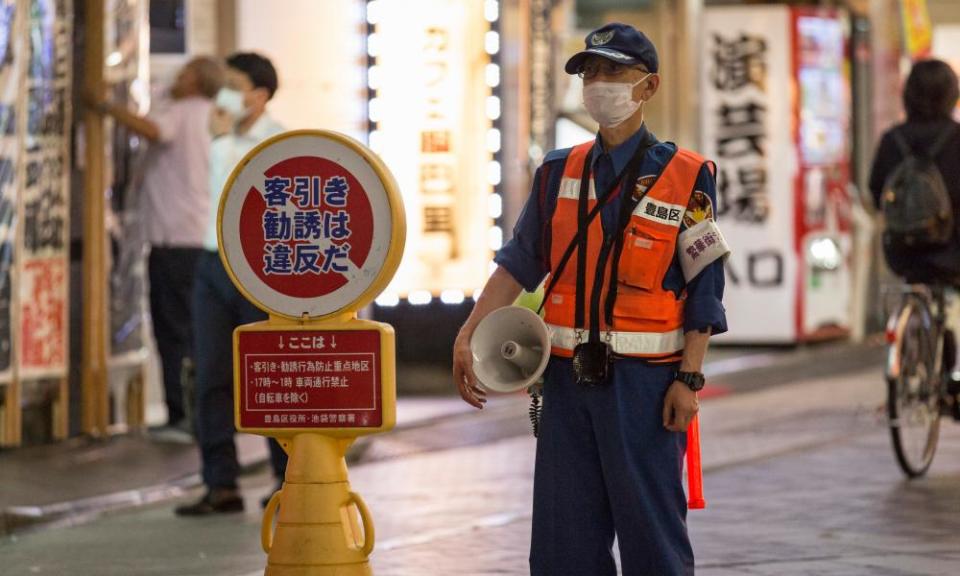Shinzo Abe accused of going awol as Japan tackles Covid surge
After Japan appeared to have brought the coronavirus outbreak under control in late May, the prime minister, Shinzo Abe, acclaimed his country’s response as a “model” for the rest of the world. It had avoided an explosion in cases, he said, and without the compulsory lockdowns imposed in Europe and the US.
Abe lifted the seven-week state of emergency, enabling bars and restaurants that had voluntarily closed to reopen for business. Plans were made to allow indoor events with up to 5,000 attendees, and the media trailed the launch of an economy-boosting nationwide tourism campaign.
But as it prepares for the Obon public holiday, when millions of people traditionally return to their hometowns, Japan is struggling to address record rises in Covid-19 cases amid renewed warnings about pressure on its health service, and its largely silent leader has been accused of abandoning his post.
Tokyo alone has reported more than 200 cases a day for the past 10 days, including a record 472 last Saturday and 360 on Thursday. Other urban hotspots are reporting similar surges in new infections, prompting local leaders to take action while ministers caution against any overreaction.
Political analysts speculate that Abe has settled on a laissez-faire approach, rather than make tough decisions on new restrictions that could send the world’s third-biggest economy, already officially in recession, deeper into the mire.
“In one sentence, the government’s supposed unstated position – often referred to as ‘with coronavirus’ – is that the authorities will provide the healthcare, medicine and vaccines, but if you get infected that’s on you,” Takashi Ryuzaki, a political science professor at Ryutsu Keizai University, told the Japan Times.
The public appears to be losing faith, with a poll published on Monday showing that 61% disapproved of the cabinet’s handling of the pandemic, while 26% approved. Abe’s personal approval rating plummeted to a record low of 35%, while more than 60% of respondents said he should declare a second state of emergency.
Disturbed by the surge in infections, some local leaders are refusing to wait for guidance from Tokyo. Aichi prefecture, which is in the midst of a surge centred on the industrial city of Nagoya, has declared a state of emergency, as has Okinawa, where cases have been traced to US military bases.

In Osaka, the second-worst affected prefecture, the governor, Hirofumi Yoshimura, prompted panic-buying of an over-the-counter gargling medicine this week after claiming, with scant medical evidence, that it made people who had mild Covid-19 symptoms less infectious.
Tokyo’s governor, Yuriko Koike, has requested restaurants and karaoke venues where alcohol is served to close early, at 10pm, through to the end of the month, with a one-off payment of 200,000 yen (£1,440) available to businesses that comply.
She has also called on Tokyo’s 14 million residents not to make travel plans over Obon, which begins on Monday, amid signs the virus has taken hold in regions that had previously avoided the worst of the outbreak. Iwate, a northern prefecture that had gone months without registering a single case, reported its first infections last week.
Concern still centres on the capital, where early clusters linked to young people connected to its host and hostess club scene have been joined by rising infections traced to after-work drinking sessions, where people let their masks – and their avoidance of the “three Cs” – slip. Tokyo accounts for a third of Japan’s total of 43,519 cases. The country had recorded 1,041 deaths as of Wednesday,
Tokyoites were hastily excluded from the heavily subsidised Go To tourism campaign, but the government encouraged the rest of the country to take part, even after one of its experts cautioned against the scheme while cases were rising sharply.
Abe attended a ceremony to mark the 75th anniversary of the Hiroshima bombing on Thursday, but has not held a press briefing for more than a month, leaving most of the talking to his cabinet colleagues.
This week, government officials dismissed claims made in a weekly magazine that Abe, whose first term as prime minister was blighted by a chronic bowel disease, had been forced to slow down after vomiting blood in early July.
He has ditched the much-derided symbol of his Covid response, swapping his “Abenomask” – one of the tiny face coverings the government sent to tens of millions of households – for a larger alternative.
Officials continue to dismiss calls for tougher measures, pointing out that wider testing is inevitably producing more positive diagnoses, and that the number of serious cases and deaths remains much lower than in April, when Abe declared a state of emergency.
Jeff Kingston, the director of Asian studies at Temple University in Tokyo, believes Abe has ruled out a return to the stricter measures that helped Japan emerge from the initial outbreak comparatively unscathed.
“The pandemic has been a severe stress test for leaders everywhere, but in the eyes of the Japanese public, Abe has failed to provide leadership and a coherent response,” Kingston said. “His overall response has been shambolic. He has consistently treated this more like a PR crisis rather than a public health problem, and has prioritised reopening the economy at the expense of containing the outbreak.”

 Yahoo News
Yahoo News 
